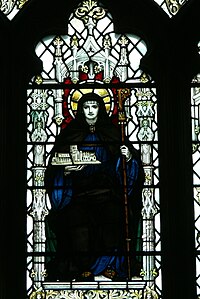Werburh
| Saint Werburgh | |
|---|---|

Saint Werburgh, Chester Cathedral.
|
|
| Born | ca. 650 Stone, Mercia |
| Died | 3 February 700 Trentham |
| Major shrine |
Hanbury then Chester Cathedral |
| Feast | 3 February |
| Patronage | Chester, England |
Werburgh (also spelled Wærburh, Werburh or Werburga) (d. 3 February 699 at Trentham in modern-day Staffordshire) was an Anglo-Saxon princess who became the patron saint of the city of Chester in Cheshire. Her feast day is 3 February.
Werburgh was born at Stone (now in Staffordshire), and was the daughter of King Wulfhere of Mercia (himself the Christian son of the pagan King Penda of Mercia) and his wife St Ermenilda, herself daughter of the King of Kent. She obtained her father's consent to enter the Abbey of Ely, which had been founded by her great aunt Etheldreda (or Audrey), the first Abbess of Ely and former queen of Northumbria, whose fame was widespread. Werburgh was trained at home by St. Chad (afterwards Bishop of Lichfield), and by her mother; and in the cloister by her aunt and grandmother. Werburgh was a nun for most of her life. During some of her life she was resident in Weedon Bec, Northamptonshire.
Werburgh was instrumental in convent reform across England. She eventually succeeded her mother Ermenilda, her grandmother Seaxburh, and great-aunt Etheldreda as fourth Abbess of Ely. She died on 3 February 700 and was buried at Hanbury in Staffordshire.
Following Werburgh's death, her brother Coenred had become king of Mercia. In 708 he decided to move his sister's remains to a more conspicuous place within the church at Hanbury. When the tomb was opened, her body was found to be miraculously intact. This preservation was taken as a sign of divine favour. A year later Coenred had abdicated as king and taken holy orders, becoming a monk in Rome. It was at this time that the most famous story about Werburgh appeared, according to which she restored a dead goose to life. A stained glass window in the Church of St Peter and St Paul, Weedon Bec, Northamptonshire relates to another tale in which she was said to have banished all the geese from the village.
...
Wikipedia
